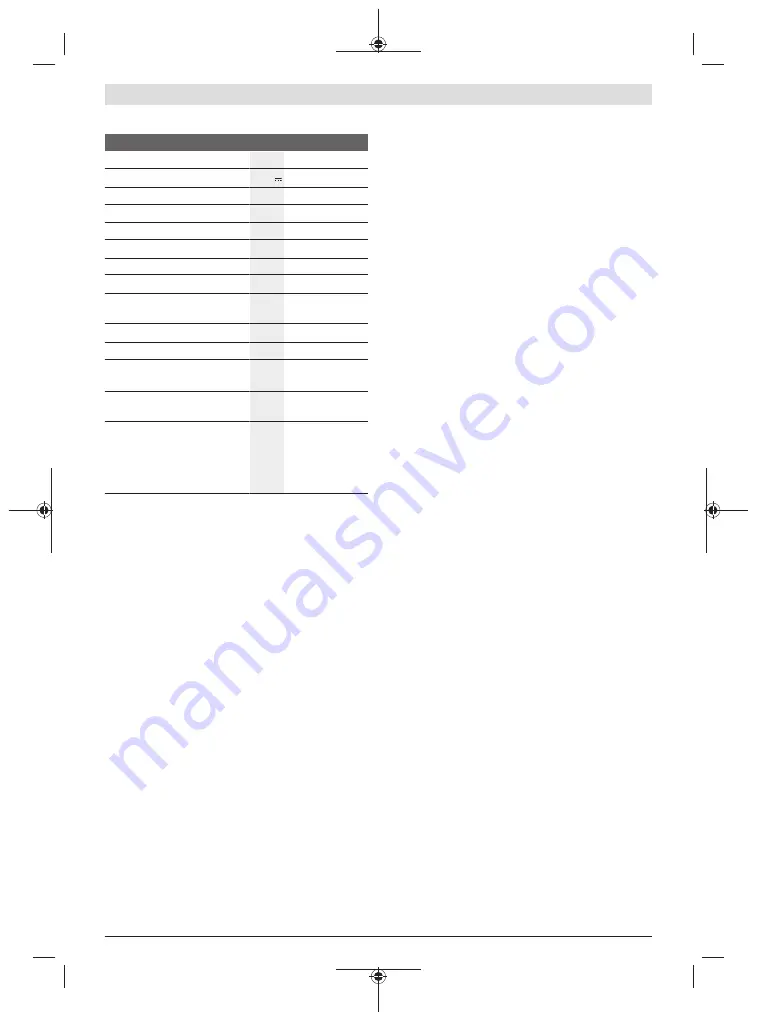
English |
15
Technical data
Planer
GHO 12V-20
Article number
3 601 EA7 0..
Rated voltage
V
12
No-load speed
min
-1
14,500
Cutting depth
– optimum
mm
0 – 1.0
– maximum
mm
1.0 – 2.0
Rebating depth
mm
0 – 17
Max. planing width
mm
56
Weight according to
EPTA-Procedure 01:2014
kg
1.7 – 1.9
A)
Permitted ambient temperature
– during charging
°C
0 to +45
– During operation
B)
and dur-
ing storage
°C
-20 to +50
Recommended batteries
GBA 12V...
GBA 10.8V...
Recommended chargers
AL 11.. CV
GAL 1110 CV
GAL 12.. CV
GAL 12V-..
GAX 18V-30
A) Depends on battery in use
B) Limited performance at temperatures <0 °C
In unfavourable conditions, it is possible that the power tool may
switch itself off due to electrostatic discharge. After switching the
power tool back on again, it will work as intended.
Noise/vibration information
Noise emission values determined according to
EN 62841-2-14
.
Typically, the A-weighted sound pressure level of the power
tool is
79
dB(A). Uncertainty K = 3 dB. The noise level when
working can exceed 80 dB(A).
Wear hearing protection
Total vibration values a
h
(triax vector sum) and uncertainty K
determined according to
EN 62841-2-14
:
a
h
<
2.5
m/s
2
, K =
1.5
m/s
2
,
The vibration level and noise emission value given in these
instructions have been measured in accordance with a
standardised measuring procedure and may be used to com-
pare power tools. They may also be used for a preliminary
estimation of vibration and noise emissions.
The stated vibration level and noise emission value repres-
ent the main applications of the power tool. However, if the
power tool is used for other applications, with different ap-
plication tools or is poorly maintained, the vibration level
and noise emission value may differ. This may significantly
increase the vibration and noise emissions over the total
working period.
To estimate vibration and noise emissions accurately, the
times when the tool is switched off or when it is running but
not actually being used should also be taken into account.
This may significantly reduce vibration and noise emissions
over the total working period.
Implement additional safety measures to protect the oper-
ator from the effects of vibration, such as servicing the
power tool and application tools, keeping their hands warm,
and organising workflows correctly.
Fitting
u
Remove the battery from the power tool before carry-
ing out work on the power tool (e.g. maintenance,
changing tool, etc.). The battery should also be re-
moved for transport and storage.
There is risk of injury
from unintentionally pressing the on/off switch.
Battery Charging
u
Use only the chargers listed on the accessories page.
Only these chargers are matched to the lithium-ion bat-
tery of your power tool.
Note:
The battery is supplied partially charged. To ensure
full battery capacity, fully charge the battery in the charger
before using your power tool for the first time.
The lithium-ion battery can be charged at any time without
reducing its service life. Interrupting the charging process
does not damage the battery.
The lithium-ion battery is protected against deep discharge
by the "Electronic Cell Protection (ECP)". When the battery
is discharged, the power tool is switched off by means of a
protective circuit: The application tool no longer rotates.
u
Do not continue to press the On/Off switch after the
power tool has automatically switched off.
The battery
can be damaged.
Follow the instructions on correct disposal.
Removing the battery
To remove the battery
(5)
, press the release button
(6)
and
pull the battery to the rear and out of the power tool.
Do not
use force to do this.
Changing the Tool
The hex key
(18)
required for changing the planer blade is
housed inside the power tool and should always be stored
there (see figure
F
).
u
Take care when changing the planer blade. Do not pick
up the planer blade by the cutting edges.
You may be
injured by the sharp cutting edges.
Use only original
Bosch
HM/TC planer blades.
The hard metal (HM/TC) planer blade has two cutting edges
and can be turned. If both cutting edges become blunt, the
planer blade
(17)
needs to be changed. The HM/TC planer
blade must not be resharpened.
Removing the planer blade (see figure A)
To turn or replace the planer blade
(17)
, turn the blade head
(19)
until it is parallel to the adjustable planer base plate
(14)
.
Bosch Power Tools
1 609 92A 4LD | (19.02.2019)
















































